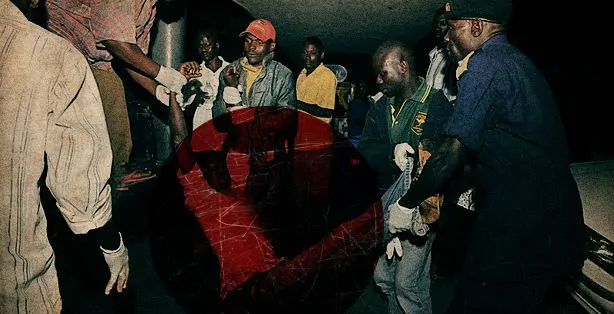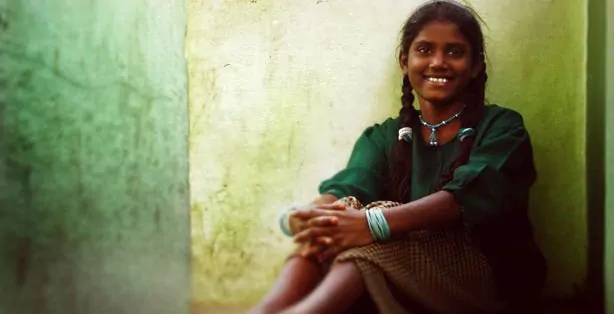
Maya Kimberley Prabhu, a journalist with The Independent magazine in Uganda, was down the street from the bombing that took place during a World Cup viewing party last weekend. More than 70 people were killed and many were injured. One of those killed was 25-year-old Nate Henn, an American who worked for Invisible Children. Here, Prabhu describes what she heard and initial thoughts on what occurred.
In Kampala this African World Cup has had me spending my evenings squeezed into packed bars and the outdoor spaces at pubs and restaurants in front of large screens, amid vuvuzela blasts and cheers and tension and football talk. Sunday’s final was set to be no different …
We heard a resounding, full-throated bang partway into the second half. We looked at each other in alarm—suggested fireworks, car backfire or road-works as an explanation—but the sound was too round and whole and earthy. We heard another one and I got nervous. But no one else at the restaurant was reacting. Still jittery, I fumbled for my phone in my bag and picked up instantly when it rang. My friend spoke quickly—a bomb at an Ethiopian restaurant, 10 dead, they’re saying everyone should get home. I repeated her words aloud as she spoke. We were at the car by the time I hung up.
We tried to make sense of it—could we have heard the bomb all the way from across town? And we had certainly heard two explosions, not one. Were they targeting foreign nationals? Ethiopian Village is popular with young expats living in Kampala. Back home, the Internet wasn’t working (we later read that the bombs had damaged the ICT infrastructure in Kampala), but we turned to the local TV channels and I got on the phone to colleagues who I knew would be at the scene. There had been two more bombs at a local rugby ground, not far from where we had been watching the game—these were the blasts we had heard. Fatality figures were being quoted at anywhere between 10 and 40. John, a friend and colleague who was at the scene, told me, “The bodies … the bodies are horrible.” Like the Ethiopian restaurant, the Rugby Club had a huge screen and lots of seating. The two locations would have been among the most crowded in Kampala during the World Cup Final.
We heard a resounding, full-throated bang partway into the second half.
I grew up in Indonesia, Zimbabwe and Kenya, and I’ve seen rioting and violence in the streets a few times—most recently in Kenya in 2007—but bombs are a new and altogether more frightening thing to me.
Al-Shabaab and Ugandan rebels ADF were being talked about as perpetrators—it was clear it had been a terrorist attack. I got through to my sister in Washington, D.C., who had worked for a Somali NGO in Nairobi for several months—the news hadn’t gotten there yet, and she sounded shocked. “Al Shabaab? My God.”
The Internet started working, slowly, and I started posting the information I was receiving from my calls to journalists on the scene on my blog. On the TV, UBC, NTV and Al Jazeera were getting images from the Rugby Club. It was pretty grim. By 2 a.m., I had persuaded my boyfriend to take me down to the Rugby Club. By the time we got there, everything was quiet—eerily empty considering that the club lies on the main road into Kampala from the east. Twenty-odd cars were parked and empty by the side of the road, and policemen stood by, apparently idle. I called John again and asked him where he was—he told me to get out of there, immediately, to meet him nearby so he could fill me in.
John waited by the side of the road in shorts and a Holland T-shirt. He leant into the window and told me hurriedly that the Inspector General of the police had imposed a curfew and the cops were cracking down. Behind him, policemen on motorbikes arrived and began chasing pedestrians, beating them with truncheons. John ducked out of the way of one of the blows, clambered into the car and we took him home.
I stayed up until 5 a.m., posting new information on Facebook and my blog, calling friends to make sure they were alright, and trying to find another colleague a ride back from the main hospital after the curfew had cleared the streets.
Three days later, the streets and markets are filling up again as people go about their business. But Kampala is nervous—the papers print gruesome images from the scenes of explosion, false rumors of new bombs get repudiated each day, a man was arrested on Kampala’s main road for throwing away a mobile phone and a fourth bomb was found, unexploded, and disarmed by the police. The official body count has risen to 76. I hear that the Somali community in this city is scared of retaliation, now that Somali militants Al-Shabaab have claimed responsibility for that attack. I overhear conversations: “it could have been me,” and, “What’s next?”
A version of this post originally appeared on the ONE blog.





















